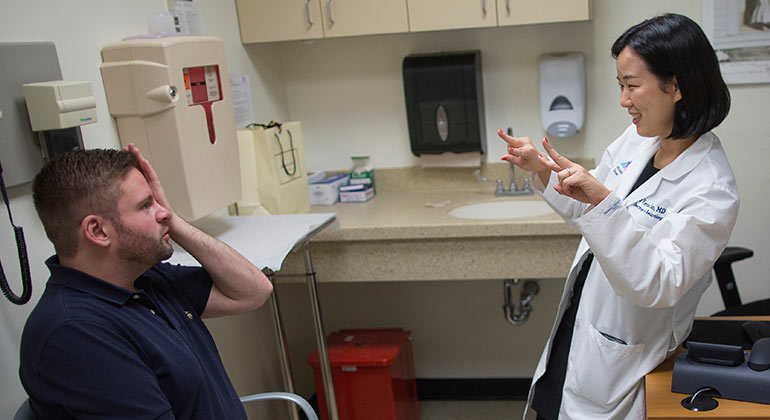Epilepsy Diagnosis and Evaluation

The first step in treatment is gaining a thorough understanding of you and what is causing your events. We start by taking a detailed history and conducting a thorough physical exam, which remains the most important part of the assessment. We may order other tests to answer further questions, confirm the diagnosis, and help advance treatment in a supervised setting, such as the following:
Brain imaging
It is important to investigate if there is a structural cause for seizures. A CT scan is often done in emergency rooms and will help diagnose an obvious problem. An MRI is a more detailed picture and gives us more information. When considering epilepsy surgery, we might perform a PET scan—which looks at activity in various brain regions—as well. Between seizures, the area that generates the seizures is often less active than other areas.
Electroencephalogram
One of the most basic and important tests, an electroencephalogram (EEG) measures the electrical activity in the brain. During an EEG, we place electrodes on the head in specified positions. This test is not painful. There are different types of EEG’s.
- Routine EEG: This test is done in the office, usually before an outpatient visit. It takes one hour. It can confirm the diagnosis of epilepsy and in certain cases will tell us if medication is effective.
- Inpatient video EEG: Sometimes we ask a patient to come into the hospital for a few days to monitor brain waves continuously. The patient is admitted to one of our epilepsy monitoring units, either at The Mount Sinai Hospital, Mount Sinai West, or Kravis Children’s Hospital at Mount Sinai. During the admission, we continually record brain waves and observe the patient. Admission for inpatient EEG is done for pre-surgical work-up, to establish a diagnosis, or to change medication in a supervised setting.
- Ambulatory EEG with or without video: Continuous EEG can also be done at home. For this test a patient comes to the office so that electrodes may be placed on the head, and the patient leaves with a small portable box that stores the information. At-home EEGs are used to help diagnose events that happen frequently at home, or if a patient is unsure if they are having seizures on their current treatment regimen.
Neuropsychological Testing
Memory complaints are common in epilepsy. These difficulties can be caused by medication, by the seizures themselves, or by an underlying neurological difficulty. Maximizing the overall cognitive wellness of people with epilepsy is very important to us. To do this we sometimes perform neuropsychological testing. Our supportive and welcoming neuropsychology team provides comprehensive cognitive, behavioral, and academic achievement evaluations using standardized tests to understand each person's cognitive abilities. These assessments are used to aid in diagnosis and treatment planning. For people considering epilepsy surgery, we always do neuropsychological testing.